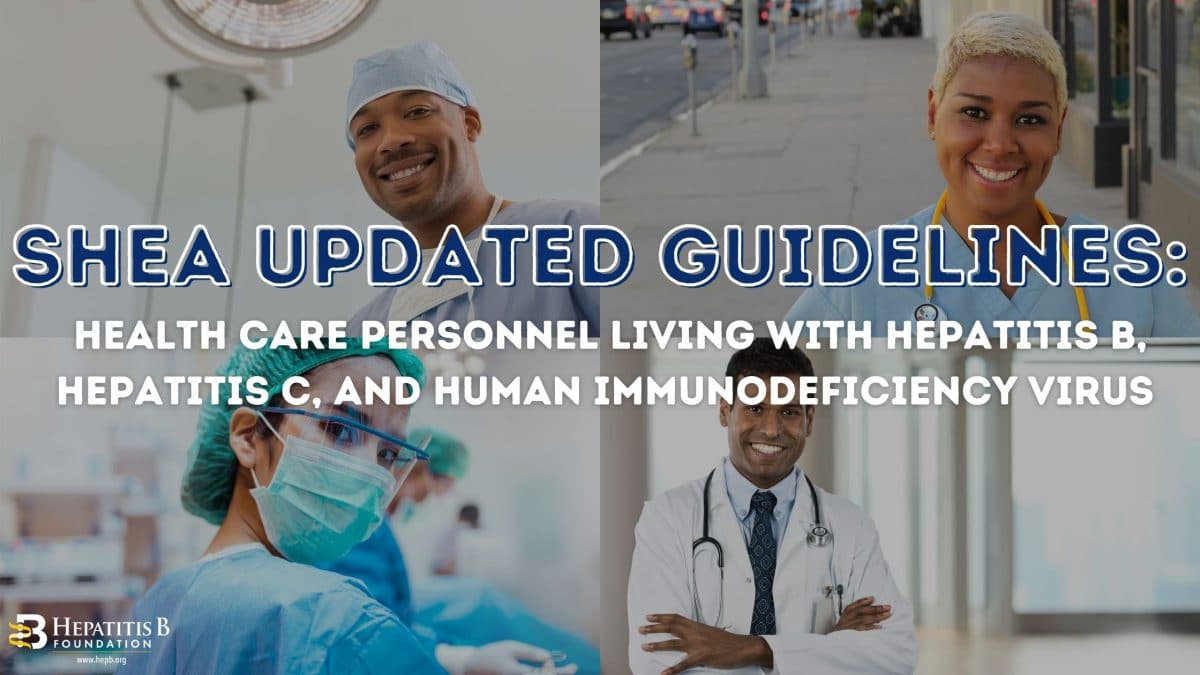
Many health care students and professionals in the U.S. are living with hepatitis B, hepatitis C or HIV. Living with these conditions should not interfere with a person’s health care education or professional career. It is important that health care students and professionals are aware of their rights and responsibilities – and equally important that health care schools and institutions are aware of their responsibilities, as well. There are now new guidelines to help institutions understand how to manage health care professionals living with hepatitis B, hepatitis C or HIV.
The Society of Healthcare Epidemiology of America (SHEA) recently updated their guidelines on health care workers who are living with hepatitis B (HBV), hepatitis C (HCV), and human immunodeficiency virus (HIV). These updates reflect the advances in medical technologies and the low transmission risk health care workers living with HBV, HCV, and HIV pose. It is important to note, there have been very few cases of health care personnel (HCP) transmitting HBV, HCV, or HIV to patients. These new guidelines, which align with the CDC’s Recommendations for the Management of Hepatitis B Virus-Infected Health-Care Providers and Students, can help reduce discrimination of health care students and personnel.
Some of the important updated recommendations for health care workers living with hepatitis B include:
- Pre-vaccination testing does not need to be done unless the individual has an increased risk of infection
- Health care workers should have a complete vaccination series for hepatitis B. Learn more about the vaccination series
- Health care professionals living with HBV who do not perform exposure-prone procedures should not be prohibited from participating in patient-care activities solely on the basis of their HBV infection
- Health care personnel living with HBV should seek optimal medical management, including, when appropriate, treatment with effective antiviral agents
- Consistent with CDC guidelines, there is no justification for, nor benefit gained from, notifying patients with regard to health care professionals living with HBV who are being managed through an institution’s oversight panel
Some of the important updated recommendations for health care workers living with hepatitis C includes:
- Because of the opioid epidemic in the United States, consideration should always be given to the possibility of substance use disorder when health care professional-to-patient transmission of a bloodborne pathogen is detected
- Health care professionals living with HCV should seek optimal medical management, including treatment with effective antiviral agents to achieve cure of the infection
- Health care professionals living with HCV who received treatment resulting in ‘undetectable’ circulating HCV-RNA levels can perform exposure-prone procedures with some stipulations:
- Has not been previously identified as having transmitted infection to patients following definitive therapy resulting in a sustained virologic response (SVR)
- Provides the oversight panel with records and laboratory results (or permits the HCP’s personal physician to provide records and laboratory results) confirming receipt of treatment and SVR
- Has achieved SVR by remaining HCV RNA negative for 12 weeks following the completion of therapy
Some of the important updated recommendations for health care workers living with HIV:
- Health care professionals living with HIV and who, despite appropriate antiretroviral treatment, have a confirmed viral load >200 copies/mL should not perform exposure-prone procedures until they have achieved virologic suppression
- Scientists acknowledge that when the viral load is undetectable = untransmittable
- Health care professionals living with HIV whose confirmed viral load is below 200 copies/mL can perform exposure-prone procedures with some stipulations:
- Has not been previously identified as having transmitted infection to patients while receiving appropriate suppressive therapy
- Obtains advice from an oversight panel about recommended practices to minimize the risk of exposure events
- Is followed by a physician who has expertise in the management of HIV infection and who is allowed by the individual to participate in or communicate with the oversight panel about the individual’s clinical status
- Is monitored on a periodic basis (eg, every 6 months) to assure that the HIV RNA remains below the level of detection, with results provided to the oversight panel.
- Is followed closely by their physician and the oversight panel instances in which fluctuations in HIV viremia occur, including appropriate retesting as discussed above to reevaluate the HCP’s viral load
- Agrees, in writing, to follow the recommendations of the oversight panel
Read more about the guidance and information on how hospitals, professional schools, and institutions should proceed for healthcare workers living with HBV, HCV, and HIV. You can also read more about the rights and protections for health care students and professionals living with hepatitis B in the U.S.
Reference
Henderson, D., Dembry, L., Sifri, C., Palmore, T., Dellinger, E., Yokoe, D., . . . Babcock, H. (2020). Management of healthcare personnel living with hepatitis B, hepatitis C, or human immunodeficiency virus in US healthcare institutions. Infection Control & Hospital Epidemiology, 1-9. doi:10.1017/ice.2020.458
Author: Evangeline Wang, Program Coordinator, Hepatitis B Foundation
Contact Information: info@hepb.org

